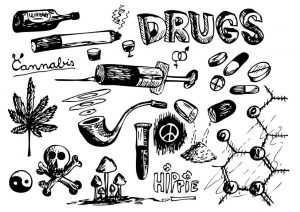In the mid-XNUMXth century, cocaine took on a gigantic proportion due to its effects and Freud's belief that it would be the cure all diseases. He even came to believe that it would be a drug to help tuberculosis and morphine addiction (which were very common at the time). There are records that point out drug prescriptions (authorized by him) to friends and family using the slogan: “Turning bad days into good days”, so much was his appreciation for the powder. As a staunch supporter of the product, the doctor was an assiduous user and, in fact, a real guinea pig, as he used his experience to report, in studies and dissertations, the effects and “benefits” that cocaine caused in his body.
Author of the book “Anatomy of an Addiction: Sigmund Freud, William Halsted, Cocaine: The Wonder of Drugs”, Dr. Howard Markel tells in his work Freud's love and madness relationship with the wonder drug, as it was known at the time. Markel says that one of the clearest changes was found in his personality. The denial of addiction made Sigmund claim not to undergo any kind of change as a result of the use he made; which succumbed to a behavior completely disguised under the nickname that anything was possible and everything was fine (typical attitude of addicts). There are reports that at least one patient died as a result of a prescription for cocaine signed by him. Addicted and with peaks of instability, many scholars of his work recognize that part of his theories were flaws, giving rise to gaps that contested them, mainly because he was a cocaine addict.
 At that time, the drug could easily be found in pharmaceutical houses and, only after a few years, it was found that its use caused addiction and destructive effects. Insomnia, increased risk of heart attacks, fainting, convulsions and respiratory arrest, damage to the nasal mucosa and nasal tissues are just some of the after-use effects on the user's health.
At that time, the drug could easily be found in pharmaceutical houses and, only after a few years, it was found that its use caused addiction and destructive effects. Insomnia, increased risk of heart attacks, fainting, convulsions and respiratory arrest, damage to the nasal mucosa and nasal tissues are just some of the after-use effects on the user's health.
Because it contains a strong content of dopamine, psychostimulant properties and anesthetic action, in some people, the addictive effect is already given in the first experience. Its dangers are devastating in character, causing, in addition to those mentioned above, risks of overdose and death.
Text written by Juliana Alves de Souza from the Eu Sem Fronteiras Team.

























